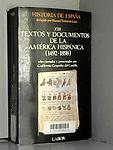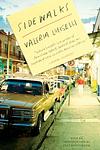The Greatest Mexican, Peruvian "Nonfiction" Books Since 1980
Click to learn how this list is calculated.
This list represents a comprehensive and trusted collection of the greatest books. Developed through a specialized algorithm, it brings together 300 'best of' book lists to form a definitive guide to the world's most acclaimed books. For those interested in how these books are chosen, additional details can be found on the rankings page.
Genres
Countries
Date Range
Reading Statistics
Click the button below to see how many of these books you've read!
Download
If you're interested in downloading this list as a CSV file for use in a spreadsheet application, you can easily do so by clicking the button below. Please note that to ensure a manageable file size and faster download, the CSV will include details for only the first 500 books.
Download-
1. América Hispánica: (1492-1898) by Guillermo Céspedes del Castillo
"América Hispánica: (1492-1898)" is a comprehensive historical analysis of Hispanic America from the time of Christopher Columbus's first voyage in 1492 to the end of Spanish rule in 1898. The author meticulously details the exploration, conquest, and colonization of the Americas, the establishment of Spanish rule, the socio-economic structures, and the eventual struggles for independence. The book offers a deep understanding of the complex and often turbulent history of Hispanic America during this period.
-
2. Letters To A Young Novelist by Mario Vargas Llosa
"Letters to a Young Novelist" is a collection of fictional letters addressed to an aspiring writer, wherein the seasoned author shares insights and reflections on the craft of writing. Through these letters, the author delves into the complexities of narrative techniques, character development, and the interplay between personal experience and fictional creation. The book serves as a mentorship from afar, offering both practical advice and philosophical musings on the art of storytelling, aiming to inspire and guide the next generation of writers in their creative endeavors.
-
3. Mexico: Biography of Power by Enrique Krauze
This book offers a comprehensive exploration of the political and social evolution of Mexico, tracing the country's history from the pre-Columbian era to the late 20th century. It delves into the lives and legacies of Mexico's influential leaders, examining how their exercise of power shaped the nation's identity and destiny. The narrative weaves through the complexities of Mexico's revolutions, reforms, and relationships with external powers, providing a deep understanding of the forces that have defined the country's path and the characters who have stood at the helm of its journey. Through a blend of biography and historical analysis, the work presents a vivid portrait of a nation's struggle for sovereignty, stability, and self-definition.
-
4. Tell Me How It Ends: An Essay in 40 Questions by Valeria Luiselli
This book is a powerful exploration of the critical issue of child immigration, focusing on the experiences of Central American children who arrive in the United States without their parents. The narrative is structured around 40 questions that the author, as a court interpreter, must ask the children to help determine their fate. The book provides a deeply personal and moving account of the human stories behind the ongoing debate over immigration and asylum laws.
-
5. Sidewalks by Valeria Luiselli
"Sidewalks" is a collection of essays that delve into the themes of urban spaces, memory, and identity through the lens of the author's experiences in different cities around the world. The narrative weaves together personal reflections, literary criticism, and philosophical musings, offering a unique perspective on the ways in which the physical landscapes of cities intersect with the internal landscapes of our minds. Through her explorations of sidewalks, cemeteries, and other urban spaces, the author invites readers to consider the profound connections between place, history, and the self, making this work a thoughtful meditation on the nature of belonging and the transient essence of life.
Reading Statistics
Click the button below to see how many of these books you've read!
Download
If you're interested in downloading this list as a CSV file for use in a spreadsheet application, you can easily do so by clicking the button below. Please note that to ensure a manageable file size and faster download, the CSV will include details for only the first 500 books.
Download



